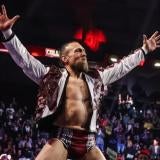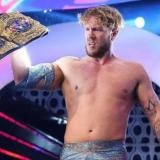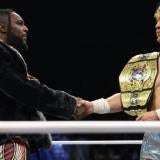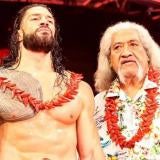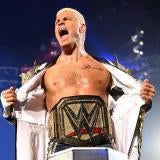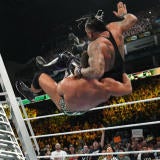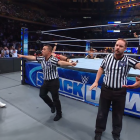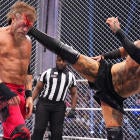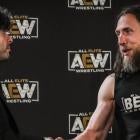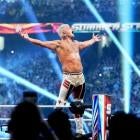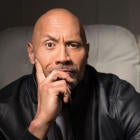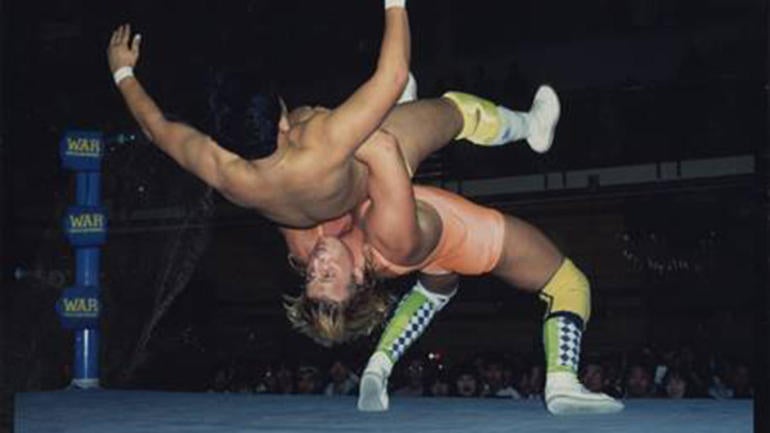
May 23 will mark the 21-year anniversary of the death of Owen Hart. At the Over the Edge pay-per-view event in 1999, Hart fell nearly 80 feet to his death as part of an elaborate entrance "stunt" for his Blue Blazer gimmick. Hart's death, which came weeks after the superstar turned 34, shocked the wrestling industry and left his wife Martha and two children with wounds that would never heal.
Martha Hart eventually entered into a bitter legal battle with WWE (then WWF) and company chairman Vince McMahon; the lawsuit spanned multiple states as she sued for wrongful death in Missouri and WWE sued to have the case heard in Connecticut. Martha Hart is featured in the season finale of Vice's "Dark Side of the Ring," a documentary series that explores some of the darkest stories in professional wrestling history.
The special season finale, "The Final Days of Owen Hart," will premiere on Tuesday at 10 p.m. ET and cover both Owen's life and the fallout from his death. Martha's involvement, she claims, has allowed the "real story" of the situation to be told to wrestling fans.
"I'm just one individual and the WWE is a PR powerhouse," Martha Hart told CBS Sports. "They've always had the upper hand with getting their message and their side of things out. This episode really provided the opportunity to tell the real story and tell how I had the biggest fight of my life. It was a real David and Goliath battle and how awful they were to me and how disrespectful they were to Owen."
Hart holds WWE directly responsible for her husband's death. WWE, she says, took shortcuts to cut costs on performing the stunt, hiring unqualified personnel and setting off a domino effect of catastrophic choices. Hart identified Bobby Talbert as the "hacker" hired after experienced rigger Joe Branam -- who had done rigging work for Elton John and The Rolling Stones, among others -- had refused to execute the stunt.
"First of all, the stunt itself was so negligent," Hart said. "They hired hackers they knew would do anything they wanted when they knew that proper riggers they had hired in the past had told them, 'We won't do this kind of stunt, it's not safe.' Everything about that stunt was done wrong. The entire set-up was wrong. The equipment was wrong -- the harness, for example, was meant for dragging people behind a car. It was a stunt harness, but it wasn't meant to suspend someone 80 feet above the ground.
"What was happening to Owen when he was sitting in that harness is, his circulation was getting cut off and he couldn't breathe. Then, the snap shackle that they used, that snap shackle is not meant for rigging humans. It's meant for the sole use of rigging sailboats. It's a sailboat clip that, by design, is meant to open on load. By the very design of the stunt, it was meant to fail, because the weight of Owen on that clip actually made it more likely it would open spontaneously.
"Proper riggers have a few things they would never do. First, they would never do a stunt without redundancy. That didn't happen; there was no redundancy. Second, they never, ever, let the talent have any control into the stunt. These guys were telling Owen, 'This cord taped here, don't pull it until you get to the ground.' That would never happen; proper riggers don't rig things this way. The other thing is, WWE is a billion-dollar company. Owen never questioned his safety. He thought for sure they were hiring people that knew what they were doing. He was putting his life in their hands, and they didn't care. They didn't have any regard for Owen's life whatsoever. They went outside of qualified riggers that had good experience."
After initial publication of the story, WWE outside legal council Jerry McDevitt reached out to CBS Sports to reflect on the case.
"The reality is, we've never told our side of the story of what happened -- at least not outside of court. We told it in court, but when she talks about the way the lawsuit unfolded over the years, it really isn't accurate what she's saying. What she did whenever this happened is, she hired a lawyer in Kansas City who we caught essentially trying to fix the judicial selection process to get a judge that was more to their liking. We caught them and went all the way to the Missouri Supreme Court. The Missouri Supreme Court said, 'No, no, no. We're not going to let that happen.' They essentially appointed an independent judge to come in from outside of Kansas City to oversee the proceedings. We were basically trying to find out what happened that night. Martha was not even remotely interested in finding out what happened that night; she just wanted to use it as a vehicle to beat up a business that she didn't like that her husband was in, the wrestling business."
One of the most controversial decisions made after Owen Hart died during the live pay-per-view was WWE's call to move ahead and complete the show. A distressed Jim Ross, who was he lead on commentary at the time, attempted to communicate details to the viewing audience after the accident, repeating that the incident -- which was not aired on the broadcast -- was not a part of the show or a storyline before making the announcement that Hart had died after the fall.
After halting the show for 15 minutes, the action resumed with performers wrestling in the same ring where a beloved member of the locker room had just died. Fans and media have criticized the promotion for that decision for decades.
"When Owen died, they scooped him out like a piece of garbage and they paraded wrestlers out to wrestle in a ring that had Owen's blood, where the boards were broken from Owen's fall and where the guys could feel the dip in the ring from where he fell. Just that disrespect and lack of respect for a human life that had just been lost," Martha Hart said. "The fact that they didn't stop the show is just appalling. Vince McMahon was a poor leader, and he failed because that talent was looking for leadership and he failed them."
Between the handling of the incident itself and the way the lawsuit would unfold over the following years, she had taken every step she can to prevent attempts to "make money off of someone they were responsible for killing."
That has included preventing WWE from inducting Owen into the Hall of Fame.
The WWE Hall of Fame inductions are traditionally held as a major event during WrestleMania weekend and are streamed live on WWE Network. That the WWE Hall of Fame does not exist as a physical structure and is only represented by an event that makes the company money through ticket sales sticks out as one of many reasons Martha Hart has said she will never allow the company to induct her husband.
"There's always been this talk that, 'Oh, we want to put Owen in the Hall of Fame,'" Hart said. "Their Hall of Fame? They don't even have a Hallway of Fame. It doesn't exist. There's nothing. It's a fake entity. There's nothing real or tangible. It's just an event they have to make money. They put it on TV and have a celebration, and it's just so ridiculous. I would never even entertain it. It's garbage."
Hart has opted to memorialize her husband through establishing the Owen Hart Foundation. The foundation provides scholarships and a homeowner program that has, according to the official website, help put more than 100 families in homes. In addition, she has worked with Vice to create a line of Owen Hart merchandise, something that has not been available in an official capacity since his death.
One of the other bits of fallout following Owen's death was a divide between Martha and her children and the rest of the Hart family. The Harts are one of the most legendary and accomplished families in wrestling history, and with their livelihood potentially impacted by her lawsuit, Martha says they attempted to help WWE undercut her lawsuit.
"Vince was manipulating Owen's family, which resulted in some of the family members working against me," Hart said. "The Hart family overall didn't support the lawsuit, but some worked against me. They stole my legal documents and were faxing them to the defense. It was like they had our whole playbook. They were just muddying the waters because they knew they didn't have the case. They just muddied the waters and made everything a mess. There was just this nonstop disrespect."
McDevitt recalls the situation differently, alleging that the Hart family was improperly offered a share of any money made off Martha Hart's court case to help her in her case and not speak with WWE.
"Her and her lawyer, in reality, had tried to get the members of the Hart family, Owen's brothers and sisters, to sign a document in which they would agree to support Martha and her case and they would not talk to WWE. In exchange for that, they were all promised a share of any verdict or settlement, which is highly illegal, completely improper and you can get in big trouble for that. What happened was some of the members of the Hart family were offended by this because they realized this was wrong. ... They knew this was wrong and they faxed me those documents, which I fell out of the chair when I read them. I was like, 'You've got to be kidding me. This is completely illegal, you can't do this stuff.' All of that was then brought to the attention of the judge in Kansas City."
Decades after the tragedy and the courtroom battles, which included an $18 million settlement in the wrongful death lawsuit in 2000 and a 2013 settlement for copyright infringement after WWE used personal photos in a Hart family documentary, Hart says that she has moved on from the most bitter of her feelings.
Speaking to the settlement from 2000, which Hart has claimed was to see justice done rather than to receive a payout, McDevitt said McMahon took responsibility for Owen Hart's death during court-ordered mediation while offering a settlement. The initial settlement, however, was turned down, according to McDevitt.
"She talked about how $18 million settlement, she didn't really want to do that, she wanted justice. Again, that's just not true. There was court-ordered mediation. We went to the mediation, and her lawyers were demanding $35 million and some admission of punitive damages. Vince told her right there, 'Look, Martha, I feel so bad for what happened. I feel responsible because this happened on my watch. I want to take care of you and your family, I loved Owen.' He was almost crying. We offered $17 million to take care of her. How many times does a CEO walk in a room and say he feels responsible? 'I'm not going to argue, I just feel responsible for what happened.' They turned it down; they wanted to go to court for their $35 million. Fine, we'll go and litigate. The next day, I get a call from her Canadian lawyer, saying they didn't want to do it because they knew what they were facing with the other things I talked about. They said, 'If you could put a little more money in. If you can go to $18 million we'll settle right now.' That's how the settlement went down."
While she has written off any strong personal relationships with the Hart family and WWE, Hart said she doesn't wish anyone any harm.
"At the end of it all, I've forgiven all of them, really," Hart said. "The Hart family, Vince McMahon, I don't hold any grudges. I hope life has been kind to all of them. My life hasn't been easy, and I certainly wouldn't wish harm on anyone.
"I don't have a relationship with [the rest of the Hart] family. That said, if I see them on the street or at an event, I'm always polite. I tell my kids to be polite and respectful. But the problem is with once you break the trust in a relationship. I'm really sad they couldn't find the strength to support me. It's unfortunate that they put their own self-interests above the welfare of me and my kids and getting justice for Owen," she said.
"That's unfortunate, but it can't be changed and is what it is. Some damage in life is irreparable. You can't fix it. It's done. Again, you can forgive people, but it doesn't mean you have to befriend them and be associated with them. At the same time, I don't wish them any harm, and I hope their lives turned out well. That's the casualties of war. They made their choices and have to live with them. Part of that is not having a relationship with me or Owen's children. That was their choice, not mine."

